17 Jul2020
By Monika Jo
Since AACTE and Mursion launched the Education Roundtable series, we have had the pleasure of showcasing the work of educators, who have integrated teacher training via virtual reality (VR) simulation into their respective programs or are studying the various aspects of this modality.
In an upcoming three-part mini-series, Carrie Straub, executive director of education programs and research at Mursion, will host a team from Harvard Graduate School of Education (HGSE) who have generously offered to share the magic behind their work. They will upack and discuss the following:
- Recruiting and training simulation specialists
- The development of simulations including how participants are oriented into Mursion experiences, models for simulation designs, and post simulation activities aimed at transferring skills
- The development of four simulations developed through the Reach Every Reader grant which HGSE designed to develop teachers as critical thinkers and learners in the classroom alongside their students
17 Jul2020
By Alexander Cuenca
The following article is Part 1 of an article by AACTE member Alexander Cuenca in which he highlights the tensions involved in continuing student teaching in the fall and shares a guidepost for educator preparation programs during the COVID-19 pandemic.
In this post, I explore how the unexamined inertia of “experience” in teacher education contributes to the hesitation of teacher education decision-makers to cancel field experiences and student teaching in the fall. Canceling field experiences and student teaching in the fall is the most responsible decision. Primarily, because even a basic understanding of the germ theory of disease during a pandemic should be enough of a rationale. However, because higher education is ensconced in the same neoliberal rationales that led to the premature opening of private and public enterprise over the last few months, teacher education programs must navigate public policy on their own. Of course, with all of the uncertainty that has been created by the response in the United States to COVID-19, I don’t pretend to know what is best for every single teacher education program. Field experiences are entangled in state licensure and certification regulations, institutional scheduling issues, and school and university partnership agreements. However, operating from the position that COVID-19 continues to pose a substantial risk to the health and well-being of students, teachers, school staff, and student teachers, I hope to provide pause for those who believe that field experiences and the student teaching experience must go on.
17 Jul2020
By Laila J. Richman and Laurie Mullen
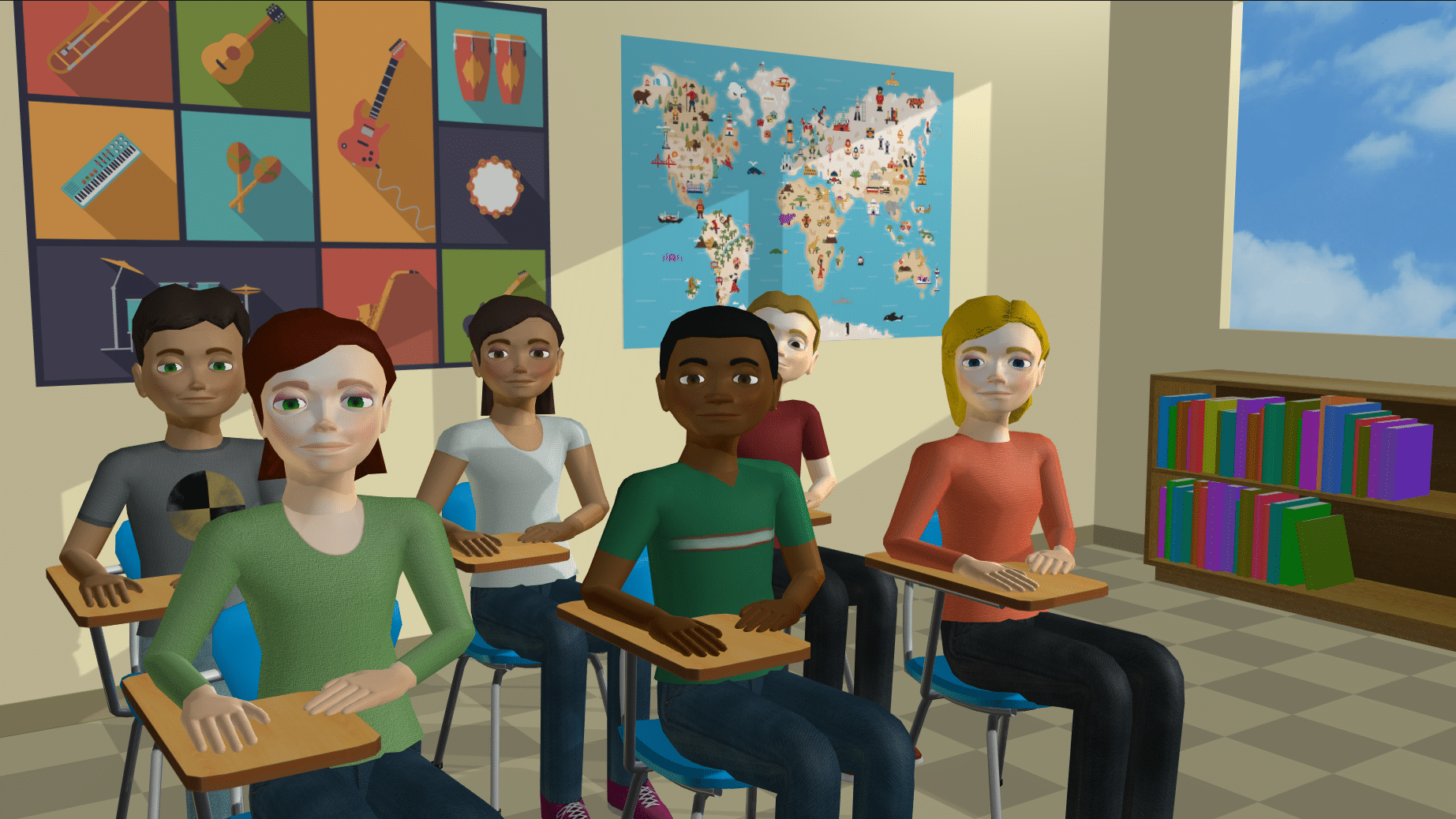
In March, when news of the coronavirus began to spread, one of our first tasks was to decide what to do with the hundreds of candidates who were in schools completing clinical experiences. This was new territory for everyone and no procedures for this type of situation had ever been developed. The decision was made to continue full-time internships, but all other field-based work was halted to allow P-12 teachers to focus on their own instruction and students. Through the strong partnerships we have with our school districts, we were able to navigate the situation and successfully graduate over 400 interns Spring 2020.
As we plan for the fall semester, while we now have some experience and advanced knowledge of the situation, the P-12 landscape will be even more varied—both within and across school districts. It has quickly become apparent that we will need to supplement our field-based work in other ways. We are assembling a range of options, including organizing a video repository, creating data-rich case studies from previous assignments, and building a tutoring network to offer virtual tutoring services to children in our local communities while simultaneously allowing candidates the opportunity to plan, implement, and evaluate their instruction. Another important option we will be utilizing to provide practice opportunities to candidates is SIMTeach@TU, our Mursion simulation system.
17 Jul2020
By Linda Minor
 AACTE is excited to offer its virtual 2020 Washington Week experience this September. The event dates have changed to offer you more opportunities to participate. Here’s the lineup:
AACTE is excited to offer its virtual 2020 Washington Week experience this September. The event dates have changed to offer you more opportunities to participate. Here’s the lineup:
Holmes Advanced Policy Course: September 2-3
On September 2, attendees will learn what to expect during the event and hear from a keynote speaker. The September 3 activities will include interactive breakout sessions and a congressional panel.
Holmes Policy Institute: September 8-10
On September 8, attendees will participate in a welcome session and engaging breakouts. Keynote speakers and panelists will show participants how to advocate for educator preparation through lively discussions and group activities. On September 10, participants will enjoy a virtual reception, including interactive games, to conclude the event.
Day on the Hill: September 9-10 and September 15-16
16 Jul2020
By Katrina Norfleet
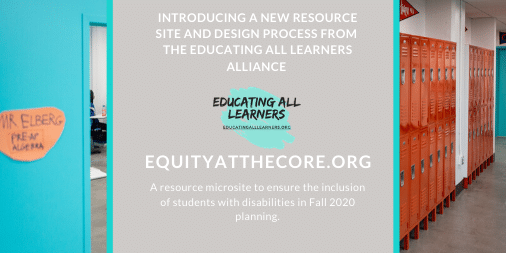
To support school leaders, teachers, students, and their families in coping with the changes brought by COVID-19, the Educating All Learners Alliance have worked with national experts and their 50-plus alliance partners, including AACTE, to develop a design process around nine critical questions to consider in reopening and recovery planning for fall 2020.
The equityatthecore.org microsite shares resources from partner organizations, hosts a discussion forum and outlines a design process to ensure that students with disabilities are not only a paragraph in the planning process but are at the center of the discussion about educating all learners to prioritize equity and inclusion.
AACTE members are encouraged to visit the site and explore this resource for administrators, teachers, and school communities. AACTE is proud to be a part of this uncommon alliance of organizations working with each other to support the recovery and reopening process.
16 Jul2020
By Ji Soo Song
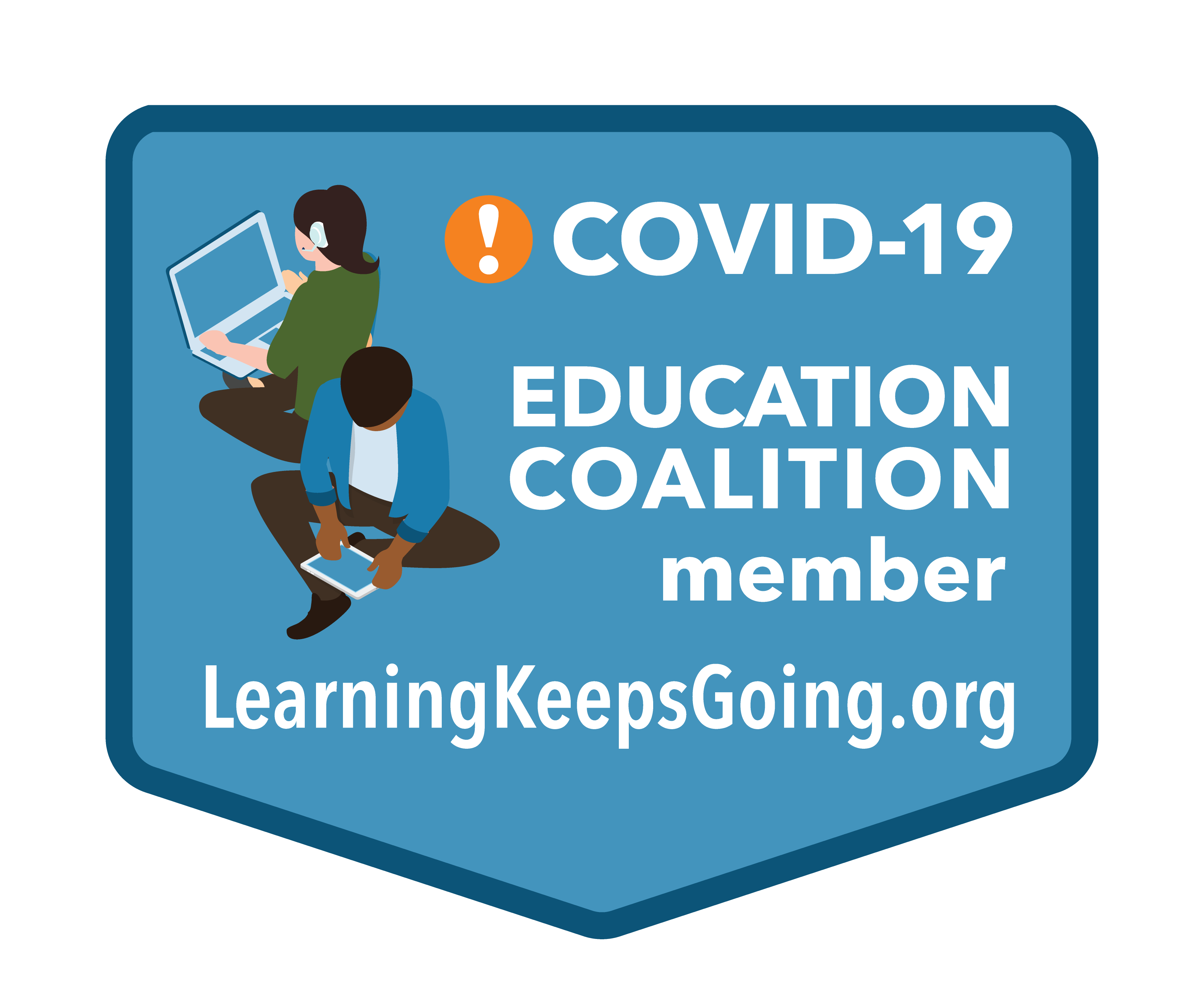
The undersigned members of the COVID-19 Education Coalition offer the following statement on the Coronavirus Child Care and Education Relief Act (CCCERA) and FY21 federal education appropriations:
As states and districts continue preparing for the upcoming school year, national data reveal the critical need to support educators’ capacity to deliver effective and equitable online learning experiences. For example, a recent survey revealed discrepancies in the quality of instruction available to students from higher-income versus low-income families. Although the CARES Act provided some federal dollars to support educator professional development, experts agree that the current education stabilization funds are inadequate to fully support schools, students, educators, and families through the COVID-19 global pandemic.
15 Jul2020
By AACTE
On behalf of the Board of Directors of the American Association of Colleges for Teacher Education (AACTE), President and CEO Lynn M. Gangone issued the following statement today regarding the Trump administration’s intent to withhold federal funds to force schools and universities to reopen with in-person education this fall:
“AACTE strongly opposes President Trump and U.S. Secretary of Education Betsy DeVos’s efforts to force schools and universities to reopen prematurely. Preserving the health and safety of students and educators during COVID-19 is essential to effective teaching and learning. The Trump administration has directed state and local governments to bear the responsibility for developing and implementing policies and practices to protect their citizens during the pandemic. As such, institutions must be allowed to implement feasible and practical measures for reopening tailored to the needs of their local communities.
Federal funds should not be used as leverage to force schools and universities to provide in-person classes amidst the current surge of the coronavirus. Instead, federal funds must be allocated to aid colleges and universities in their recovery from the significant, financial challenges caused by the pandemic, to equip institutions with the proper tools to reduce the spread of coronavirus on their campuses, and to provide liability protection.
AACTE calls upon our nation to protect the health and well-being of those most vulnerable in our education communities and to implement bipartisan efforts that will strengthen school safety plans.”
13 Jul2020
By Lynn M. Gangone
 We live in a society that is rapidly changing. The worldwide pandemic has shown us the harsh, but important, reality that divisiveness, inequality, and discrimination persist in our country. The murders of George Floyd, Ahmaud Arbery, Breonna Taylor, and too many others are stark evidence that racism still has deep and seemingly impenetrable roots in our country. This profound moment in time has brought despair to and heightened protest not only within the Black American community, but to people of all races throughout our country and the world. While addressing and rectifying these injustices requires the concerted effort of all American citizens, educators play an essential role in creating and ensuring an equitable existence for everyone.
We live in a society that is rapidly changing. The worldwide pandemic has shown us the harsh, but important, reality that divisiveness, inequality, and discrimination persist in our country. The murders of George Floyd, Ahmaud Arbery, Breonna Taylor, and too many others are stark evidence that racism still has deep and seemingly impenetrable roots in our country. This profound moment in time has brought despair to and heightened protest not only within the Black American community, but to people of all races throughout our country and the world. While addressing and rectifying these injustices requires the concerted effort of all American citizens, educators play an essential role in creating and ensuring an equitable existence for everyone.
Throughout our nation’s history, education has been pivotal in fostering citizenry. Abolitionist leaders understood the importance of a quality public education in promoting democracy. William Lloyd Garrison called for “a broader basis for government which includes all the people, with all their rights in their hands, and with an equal power to maintain their rights.” Wendell Phillips insisted that knowledge was given to impart upon others. Harriet Tubman instilled within us that “every great dream begins with a dreamer.” And Frederick Douglass wrote that “once you have learned to read, you will be forever free.”
13 Jul2020
By Katrina Norfleet
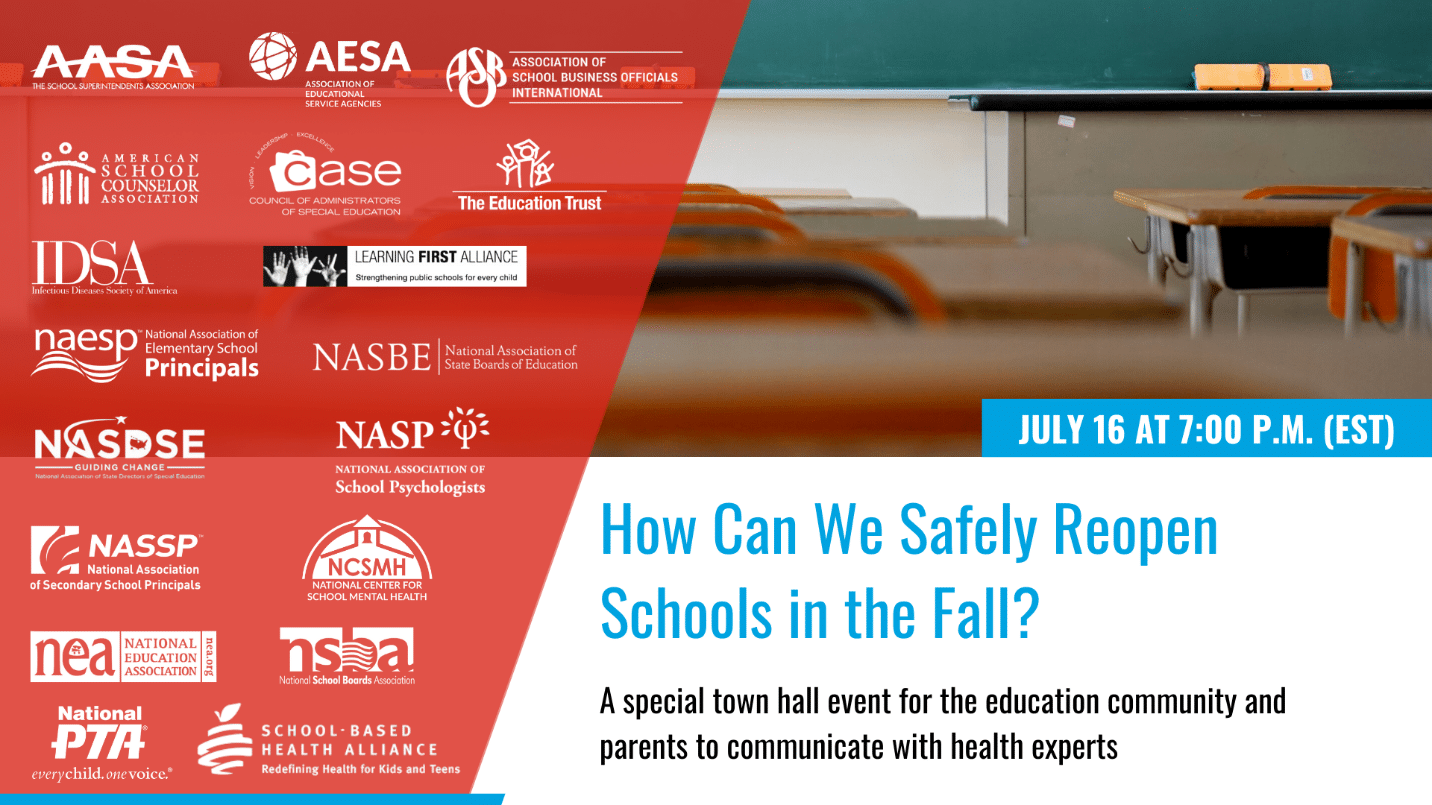
The education community and parents are invited to join a virtual town hall to talk with health experts about the re-opening of schools in the fall. The event, hosted by a group of national education organizations, will take place Thursday, July 16 from 7:00 – 8:15 p.m. ET.
When COVID-19 began its slow spread across the country, schools in every state shut their doors to help flatten the curve—and they stayed closed for in-person instruction through the rest of the 2019–20 school year. While businesses and other industries are beginning to reopen, it’s clear that the economy relies on our public education system for true recovery.
13 Jul2020
By Jane E. West
This blog post is written by AACTE consultant Jane West and is intended to provide updated information. The views expressed in this post do not necessarily reflect the views of AACTE.

It’s been a busy — if not dizzying — week in DC – from movement on funding bills in the House to Trump Administration threats to withhold education funding and withdraw non-profit tax status from schools that do not fully open in the fall. The rest of July will likewise be action packed and fraught as Congress sprints to the August recess.
House Appropriations Subcommittee Adopts Education Funding Bill for FY 2021
On Tuesday, the House Subcommittee on Labor/HHS/Education Appropriations, chaired by Rep. Rosa DeLauro (D-CT), adopted a spending bill for FY 2021, which begins October 1.
Because the bill was required to stay within previously agreed upon budget caps, there were only modest increases for education. Overall, education spending was increased by 1.7%, or $1.2 billion, bringing federal education spending to a total of $73.5 billion.
13 Jul2020
By Heather Howell
Experiencing disruptions to your elementary mathematics or science methods courses due to COVID-19? We may be able to help!
ETS is currently recruiting teacher educators who will be teaching elementary mathematics or science methods courses in the fall 2020 semester to participate in a new NSF-funded study (#2032179). The study will provide simulated teaching practice through the Mursion® virtual environment to pre-service elementary teachers (PSETs) enrolled in your methods course.
The simulated teaching tasks used in the study focus on leading argumentation-focused discussions in either mathematics or science at the fifth-grade level. Teacher educators selected to participate will incorporate one simulated teaching task into their course as an assignment for their PSETs and will agree to participate in surveys and focus group interviews reflecting on their experience.
For a more detailed description, please follow this link, where you will also be able to apply. Applications close July 27.
Heather Howell is a research scientist at ETS.
10 Jul2020
By Jacqueline E. King, Ph.D.
 The AACTE Board of Directors recently created two new advisory committees to promote diversity in the educator workforce and among future leaders and scholars in educator preparation. These committees will be an integral part of fulfilling the strategic priority of diversity, equity, and inclusion outlined in AACTE’s new strategic plan.
The AACTE Board of Directors recently created two new advisory committees to promote diversity in the educator workforce and among future leaders and scholars in educator preparation. These committees will be an integral part of fulfilling the strategic priority of diversity, equity, and inclusion outlined in AACTE’s new strategic plan.
Nominations are open through August 7 for positions on the new Programmatic Advisory Committee on Educator Diversity and the Holmes Program Advisory Committee
10 Jul2020
By Kevin J. Graziano
Current and former members of the AACTE Committee on Innovation and Technology (I&T) were recognized with the International Society for Technology in Education (ISTE) 2020 Journal of Digital Learning in Teacher Education (JDLTE) Outstanding Research Paper Award for their case study research, “TPACK Leadership Diagnostic Tool: Adoption and Implementation by Teacher Education Leaders” (Clausen, Finsness, Borthwick, Graziano, Carpenter, & Herring, 2019). Recipients of the award include: Jon Clausen, Ball State University; Elizabeth Finsness, Minnesota State University, Mankato; Arlene Borthwick, National Louis University; Kevin Graziano, Nevada State College; Jeffrey Carpenter, Elon University; and Mary Herring, University of Northern Iowa. The research award affirms the long-term work and impact of the AACTE I&T Committee.
The case study examined how the Technological Pedagogical and Content Knowledge (TPACK) leadership diagnostic tool was used by teacher education leaders who established and sustained organizational and learning environments for TPACK-based initiatives at three institutions. Participants indicated all components in the tool were relevant for planning and implementing their TPACK initiatives. Participants “used the diagnostic tool to engage with others about their initiatives, to consider how physical spaces and personnel could be repurposed in support of their initiatives, and to think critically about prioritizing competing political, financial, and contextual demands” (Clausen et al., 2019, p. 64).
10 Jul2020
By Alan H. Jones

At the start of June of this year, the California Council on Teacher Education (CCTE) released a “Statement on Anti-Black Racism” in which we committed to:
- Continuing to work on unlearning the impact of anti-Blackness and racism in our own lives and practices and holding one another accountable;
- Listening to and using what privilege we may have to advocate for and with our Black colleagues, Black students, and Black people in our lives;
- Supporting policies and actively working to diversify teaching and teacher education; and,
- Finding ways to respect, highlight, and learn from the work of Black students, educators, and teacher educators.
On July 15, from 1:00-2:30 p.m., we invite our teacher and teacher educator community to a webinar which will help us take action on these commitments by focusing on “Building a Pipeline for Black Male Teacher Success.” From K-12 through teacher education programs and into schools, we are losing too many Black male students and (potential) Black male educators who would be excellent teachers and role models for all students in California.
10 Jul2020
By Nicole Dunn
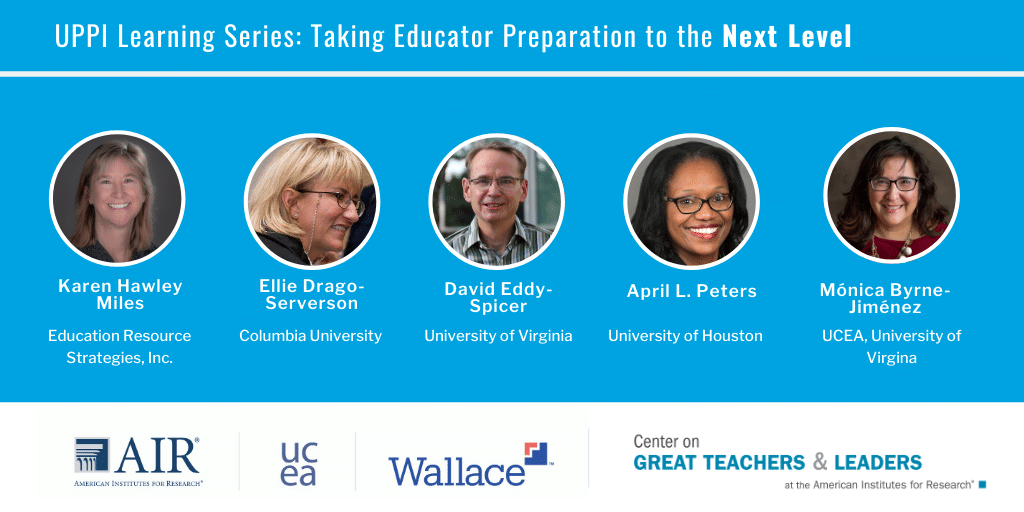
AACTE invites you to join us for the next session of The Wallace Foundation’s second University Principal Preparation Initiative (UPP) Learning Series. Teaming and engaging in meaningful and difficult conversations require teams to not only be open to learning together but also to develop their leadership abilities together. This session is designed to equip teams with tools to strengthen teamwork and engage in conversations that cultivate the leadership capacity of one another.
- Facilitator: Ellie Drago Serverson, professor of education leadership and adult learning and leadership, and director of the PhD Program in Education Leadership, Teachers College, Columbia University
- Thursday, July 16, 2020
- Presentation: 1:00–1:45 p.m. EST
- UPPI member-only discussion: 1:45–2:30 p.m. EST (A separate email will be sent with registration link for this session to all UPPI member registrants.)
- Register for the presentation.



 AACTE is excited to offer its virtual
AACTE is excited to offer its virtual 

 We live in a society that is rapidly changing. The worldwide pandemic has shown us the harsh, but important, reality that divisiveness, inequality, and discrimination persist in our country. The murders of George Floyd, Ahmaud Arbery, Breonna Taylor, and too many others are stark evidence that racism still has deep and seemingly impenetrable roots in our country. This profound moment in time has brought despair to and heightened protest not only within the Black American community, but to people of all races throughout our country and the world. While addressing and rectifying these injustices requires the concerted effort of all American citizens, educators play an essential role in creating and ensuring an equitable existence for everyone.
We live in a society that is rapidly changing. The worldwide pandemic has shown us the harsh, but important, reality that divisiveness, inequality, and discrimination persist in our country. The murders of George Floyd, Ahmaud Arbery, Breonna Taylor, and too many others are stark evidence that racism still has deep and seemingly impenetrable roots in our country. This profound moment in time has brought despair to and heightened protest not only within the Black American community, but to people of all races throughout our country and the world. While addressing and rectifying these injustices requires the concerted effort of all American citizens, educators play an essential role in creating and ensuring an equitable existence for everyone.

 The AACTE Board of Directors recently created
The AACTE Board of Directors recently created 
